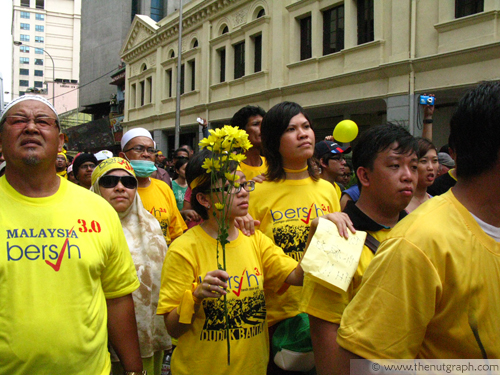 I DON’T know if my vote will make any difference to the results of the 13th general election (GE13). For one thing, our first-past-the-post electoral system means that the winning coalition tends to get a disproportionate number of seats in Parliament. In our 12 general elections so far, the proportion of seats held by the Barisan Nasional (BN) government has been between 1.25 and 1.5 times its share of the popular vote.
I DON’T know if my vote will make any difference to the results of the 13th general election (GE13). For one thing, our first-past-the-post electoral system means that the winning coalition tends to get a disproportionate number of seats in Parliament. In our 12 general elections so far, the proportion of seats held by the Barisan Nasional (BN) government has been between 1.25 and 1.5 times its share of the popular vote.
There’s also the fact that I’ll be voting from England. While the Election Commission (EC) has drafted procedures for postal voting in response to sustained public pressure, there are many uncertainties in the process. For example, it’s unclear if the campaign period will be long enough for ballot papers to be sent overseas and then back to Malaysia in time to be counted.
Given these uncertainties and distortions, does anyone’s one vote really matter in the general election, whether they vote locally or overseas?
A numbers game?
Some might argue that a single vote is insignificant. According to Ng Chak Ngoon’s analysis, in the 2008 general election, there was an average of 49,119 registered voters in each constituency – with voter turnout at 76%, the average vote counted for 0.003% of a constituency’s results. For the 112,224 voters in Kapar, the largest constituency, each vote represented just 0.001% of the total.
This is especially depressing for voters in large constituencies, which the same study found tend to be Pakatan Rakyat (PR) areas. The average number of voters in constituencies that the PR won in 2008 was 61% higher than that in BN-held constituencies.
In constituencies with popular Members of Parliament (MPs), it may seem like there is even less incentive to vote, since the incumbent might be expected to win easily. I vote in Bukit Gelugor, which Karpal Singh swept with a staggering margin of 21,015 votes in 2008.

But given how much flux there is in Malaysian politics, popularity is a slippery concept. Karpal’s history is a case in point. In 2004, Karpal won Bukit Gelugor by a much smaller margin of 1,261 votes. And in 1999, he lost the Jelutong seat – which he had held for five consecutive terms – by just 775 votes.
Overall, in the last general election, the smallest winning margin for an MP was 51 votes, in the five-cornered Sarikei fight. The smallest margin for a two-way contest was 150 votes in Wangsa Maju. Anything from bad weather to traffic could make a difference of 150 votes.
The bottom line is, every little bit counts. Despite the cliché, elections are one of the few times when you get a precise measure of how much your bit counts – which, if you like applied statistics, might be another reason to vote.
Overseas votes
What about overseas votes? As of 5 April 2013, the EC reported that a total of 6,298 Malaysians abroad had applied to become postal voters. Would their votes really matter?
Overseas voters are in a special position because their ballots are potentially insecure. If registered voters abroad do not use their ballots, and if these ballots are then abused as phantom votes in favour of candidates they do not support, by not casting their ballots, these voters could inadvertently put the candidates they do support at a disadvantage.
And votes don’t just count at the ballot box. Voting is also a symbolic affirmation of your right to participate in your country’s politics. In GE13, overseas votes will be especially symbolic because they represent a tangible and hard-won victory. Through the advocacy of tens of thousands of Malaysians, spearheaded by MyOverseasVote and Bersih, most overseas Malaysians will get to vote from abroad for the first time. Even AirAsia X has caught the excitement and is offering discounted flights home for overseas Malaysians who prefer to vote at home.
I’ve had a front-row seat for watching the advance in overseas voting rights. When Parliament was dissolved in February 2008, I was attending university in Massachusetts. I had just turned 21 and couldn’t register as a voter until I went home for the summer, but I called the New York consulate out of curiosity. The official who answered the phone casually remarked that she thought postal votes were only for students on government-funded scholarships.

When I got to England for graduate studies in autumn 2011, the EC had finally empowered overseas missions to register voters. It had also issued statements clarifying that all full-time students abroad were eligible to vote by post. Still, it took a fair amount of persuasion to convince the official at the London High Commission that I was entitled to register as an absent voter.
The overseas voting system is far from perfect. But considering how much worse it was just a few years ago, it’s very exciting that the EC is now inviting overseas Malaysians to register for postal votes.
And that’s far from the only sort of political change we’ve seen.
Sedikit-sedikit, lama-lama jadi bukit
We have seen a change in how our politicians talk. In August 1969, Tun Mahathir Mohamad notoriously wrote in the journal Opinion: “Why not call a spade a spade? Why not say bravely that the people of Malaysia are too immature for a workable democracy? Why not say that we need some form of authoritarian rule? … The disadvantage of the democratic process is that it satisfies no one … We must accept that there is not going to be a democracy in Malaysia; there never was and there never will be.”
Mahathir is still prone to critiquing the “Western” form of democracy. But in January 2013, he wrote the following on his blog: “How anyone can claim that Malaysia is a one-party state is quite incomprehensible. True, the Alliance and the Barisan Nasional have won all federal elections. But this is a democratic country and if the people chose to re-elect the government, it is their democratic right.”
It’s fascinating that our former prime minister, who was often unapologetically authoritarian during his tenure, is now using the language of democratic rights.
Prime Minister Datuk Seri Najib Razak had done the same, notably in September 2011, when he said that the Internal Security Act was being repealed to make Malaysia the best democracy in the world. Najib’s affirmations of democracy have been more talk than action – for example, the ISA has been replaced with the Security Offences (Special Measures) Act – but talk can gradually shape norms and expectations.
We’ve also seen a change in how our authorities behave. I attended Bersih 2.0 in 2011. Like many others, I was scared. We hid our yellow T-shirts till we got past the cordons, and denounced the police brutality after we got home. At last year’s Bersih 3.0 rally, protesters paraded in their yellow and green, and again faced the tear gas that they had come to expect at mass rallies. But at January’s massive Himpunan Kebangkitan Rakyat, the authorities were professional and no tear gas was in sight. Whatever the government’s motives, this is progress.

But wide-ranging progress can take a long time and is rarely smooth. Whether the regime changes in this election or another, it will be incumbent on the new leadership to develop solutions rather than gloat when evidence of the previous leadership’s mismanagement emerges, as it inevitably will.
But this is why I hope: because two years ago at Bersih 2.0, when we were fleeing the tear gas, I felt secure enough in the throng of civilised Malaysians that I grabbed my sister’s shoulder for guidance and walked ahead with my eyes closed to the fumes. No one shoved.
Because last year at a Parti Keadilan Rakyat dinner in Penang, I heard young politicians assert that no one has the right to call any other Malaysian a pendatang.
Because my RSS feed is swamped with opinion pieces and blog posts written by Malaysians who care.
Because if we look at long-run change, we’ve come so far from the days when Mahathir could blithely say that Malaysia was too immature for democracy.
My vote in GE13 matters to me because I believe that Malaysia will see meaningful democratic change within my lifetime, and I want to be part of it. ![]()
Hwa Yue-Yi is currently writing a master’s thesis on political change in Malaysia and Singapore. She is proud to be a member of Teach For Malaysia’s upcoming 2014 cohort. Teach For Malaysia focuses on addressing education inequity in Malaysia.

